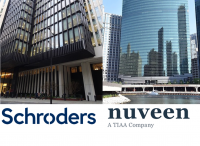
A sudden liquidity drought is a serious threat to investors in European corporate bonds, so warns Ludovic Colin, manager of the Vontobel Bond Global Aggregate Fund. It means corporate bond markets on the continent are vulnerable to a correction.
There’s a significant chance of a repeat of the November 2018 scenario, when European corporate bond prices suddenly collapsed because of a dramatic reduction in liquidity, says Colin. ‘We’ve had a very good performance so far this year, but the market has put itself in a vulnerable position. Investors have bought at high prices. If markets fall significantly, they will all be looking for the exit at the same time.’
‘Investment banks are also telling us they are drawing their inventories down because they don’t want to have risk at end of the year and prefer to lock in their profits,’ Colin adds.
Cash is king
Colin also notes a discrepancy between corporate bond prices and the financial health of corporate issuers. ‘Profit margins of companies in developed markets are under pressure across the board, but yields are still incredibly low,’ he says. ‘If you buy such a bond, you’re sure to have your money back in 2 or 3 years’ time, but you’ll get nothing more. Besides, you can’t sell any time without running the risk of losing money because liquidity is lower.’
As a consequence, Colin has increased the cash level of his portfolio to 10%. ‘Flexibility is very important, because bond markets have increasingly become tactical markets over the past few years.’
Barbell strategy
The fund manager prefers a Barbell strategy at the moment: apart from cash he also has a significant allocation to high-quality government bonds; on the other hand, riskier asset classes such as European high-yield, subordinated bank debt and emerging market debt paying higher coupons have to provide the yield. ‘That way your portfolio is well-protected, but can still provide a carry of 3% in euros,’ says Colin.
Bond investors are currently complacent, and pay too little attention to tail risks according to Colin. ‘The consensus scenario is for low growth and low inflation to continue, but a recession is not expected. This is in fact the only scenario in which investment-grade corporate bonds will provide a decent return. But I’m 100% sure this scenario will not materialise: 2020 will not be plain-sailing,’ he says.
‘Either there will be massive fiscal expansion in Germany which will create upside in growth and a rise in bond yields. Or there will be a recession. There are more and more disruptive elements, especially in Asia and Latin America, that could have an impact on risk appetite and global growth. In case of a recession, you don’t want investment-grade bonds that don’t give you any risk premium,’ he adds.
Government bonds, on the other hand, have become more attractive in recent months. ‘We especially like government bonds from the European periphery, such as Portugal.’
Low duration ≠ low risk
Because of the low interest rate environment, credit risk has become increasingly important in the eyes of investors, Colin notes. ‘Low duration used to mean low risk by definition, but that’s no longer the case. Bond markets are increasingly sentiment-driven and respond to changes in credit risk perception.’ He gives an example. ‘Last year during the dispute between Brussels and the Italian government about Italy’s budget deficit, two-year Italian government bonds dropped just as much as their 30-year peers.’
Colin saw investors react in a similar way to the arrest of former Nissan ceo Carlos Ghosn last year. ‘All Nissan bonds went down by the same, irrespective of their duration. Such sudden moves are reinforced by a lack of liquidity.’
This year duration risk has paid off for investors, but duration is not a reliable source of performance, says Colin. ‘Therefore we try to make a return elsewhere. This year we even made a loss on duration.’ The 7.3% net-return year-to-date (end of October) was derived from narrowing credit spreads, carry and high coupons from emerging market debt and subordinated European bank debt. With a 25% allocation, Colin’s fund has an especially strong position in emerging markets. The fund is mostly invested in hard currency bonds, of which a significant share is invested in oil- and gas companies. These companies are paying coupons between 10 and 12%, says Colin.
The Vontobel Bond Global Aggregate Fund has realised a return of 9% over the past year. Over the past three years, the annualised return of the fund amounts to 2.6%. This is double the return of the benchmark, the Bloomberg Barclays Global Aggregate Bond.














